Early career researchers (ECRs), including undergraduates and graduate students, postdocs, research associates and staff scientists, usually follow a lead author’s preference for publication channels. A pre-print is a final version of a research paper made publicly available prior to completion of a journal peer review process. A guide to pre-printing for early career researchers lays out why an ECR would want to submit research to a pre-print server and how to go about doing it. The authors note the increased submission rates to pre-print servers in the life sciences, such as bioRxiv and medRxiv, through the Covid-19 pandemic as a means to rapidly disseminate new research. Making timely research contributions to pressing issues is one of several advantages to publishing a pre-print:
- the paper is assigned a digital object identifier (DOI), making it a permanent part of the scholarly record and recognizing the researchers for their work;
- as a pre-print, the paper’s metadata is indexed by and discoverable through major search engines and scholarly databases;
- a pre-print is free to read, review and cite; and
- many funders allow and recognize pre-prints in grant applications and reports.
Publishing research on a pre-print server is an antidote to the work getting “scooped,” and broader exposure makes it subject to more timely examination and inclusion than it would get through a single journal peer review process. Still, lead authors and senior researchers may be resistant or afraid of sharing their work outside the journal review process. The guide advises ECRs about how to approach colleagues about pre-print publication, addressing potential points of concern and counterpoints. If all co-authors are in agreement with pre-printing, next steps include determining the server, choosing the license, preparing and submitting the work, and sharing its availability to your networks. This is a practical guide to why and how to share research on pre-print servers.
Cassandra L. Ettinger, Madhumala K. Sadanandappa, Kıvanç Görgülü, Karen L. Coghlan, Kenneth K. Hallenbeck, Iratxe Puebla; A guide to preprinting for early-career researchers. Biol Open 15 July 2022; 11 (7): bio059310. doi: https://doi.org/10.1242/bio.059310


